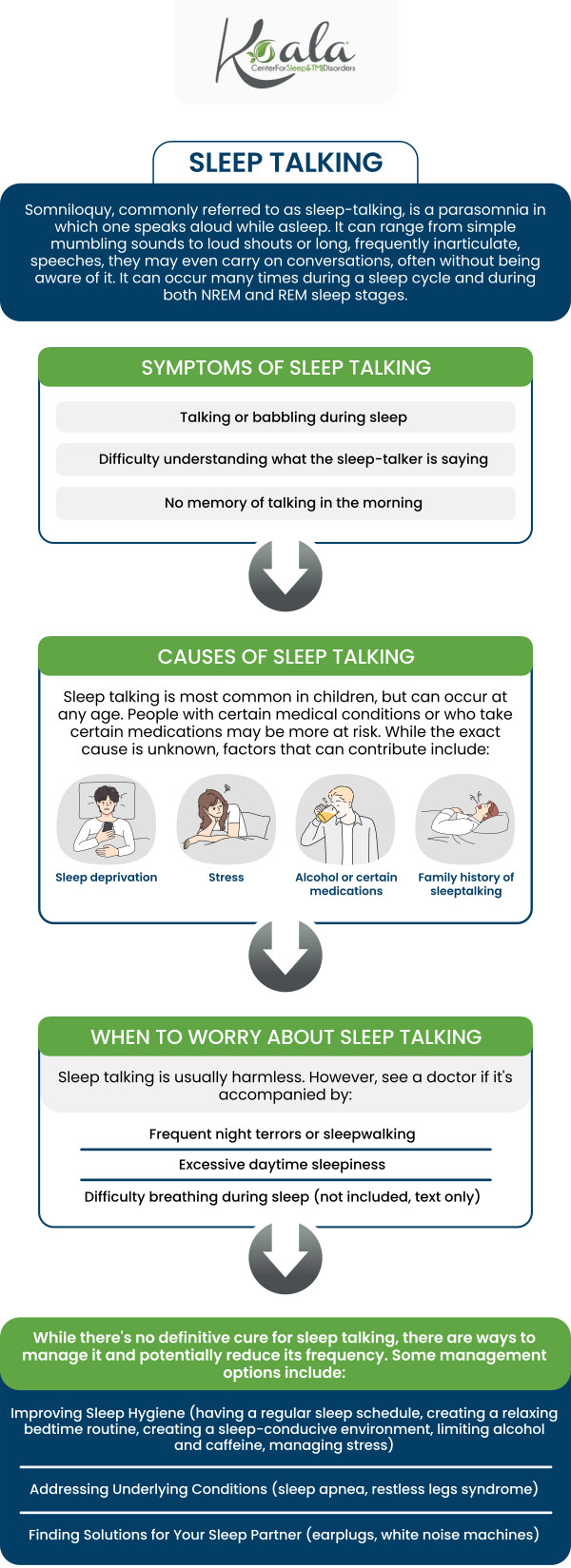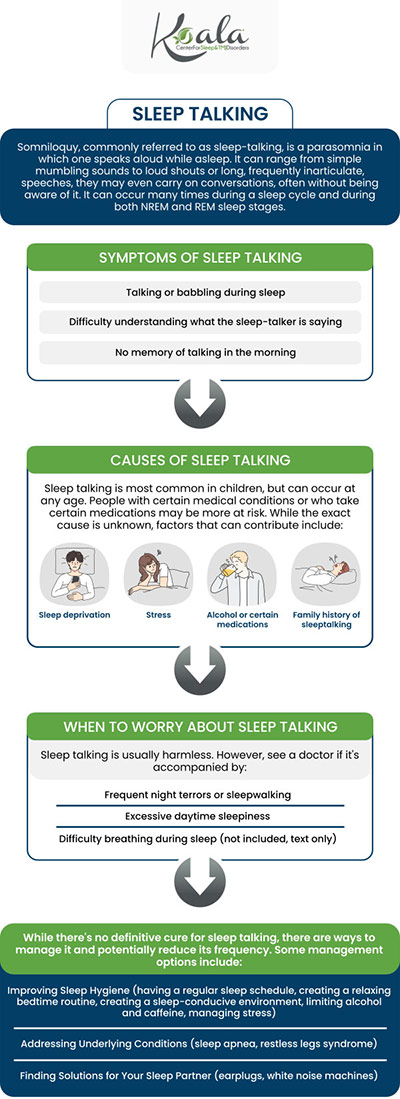Is Sleep Talking a Sign of a Sleep Disorder?
Sleep talking can sometimes be a sign of a sleep disorder, such as sleepwalking or REM sleep behavior disorder, especially if it’s accompanied by other unusual behaviors. At Koala® Center For Sleep & TMJ Disorders, our providers assess sleep patterns to identify any underlying causes. If sleep talking is affecting your rest, we can help you find effective solutions for better sleep health. For more information, please contact us today or request an appointment online. We have convenient locations in Bloomington IL, Peoria/Dunlap IL, Mishawaka IN, Kansas City MO, El Paso TX, and Wausau WI.


Table of Contents:
At what age does sleep talking usually occur?
Can sleep talking be hereditary?
What stage of sleep does sleep talking occur in?
How common is sleep talking?
Sleep talking can occur at any age and its onset is influenced by various factors, but it is most commonly observed in children and adolescents. Many cases begin in early childhood, sometimes as soon as a child starts forming sentences, and tend to become less frequent with age. While occasional sleep talking is considered normal in younger individuals, persistent or particularly intense episodes may indicate an underlying sleep disturbance. In most cases, children outgrow the habit without requiring intervention, though it can continue into adulthood in some individuals. While sleep talking tends to decrease with age, it is not exclusive to younger individuals. Adults can experience it as well, often triggered by stress, sleep deprivation, or underlying sleep disorders. In some cases, sleep talking may appear suddenly in adulthood, particularly in response to significant lifestyle changes, medication use, or disruptions to the body’s natural sleep cycles. If it becomes frequent or is accompanied by other sleep disturbances, further evaluation at Koala® Center For Sleep & TMJ Disorders may be necessary to determine any underlying causes.
There is evidence to suggest that sleep talking has a hereditary component, with studies indicating that individuals with a family history of sleep-related behaviors, such as sleepwalking or night terrors, may be more prone to experiencing it themselves. While genetics may play a role, environmental and lifestyle factors can also influence whether or not an individual develops the condition. Stress, irregular sleep patterns, and other disruptions to sleep quality can all contribute to episodes, even in those without a family history.
Because sleep talking often appears alongside other issues, such as sleepwalking, it is believed that certain neurological traits passed down through families may contribute to its occurrence. However, not everyone with a genetic predisposition will experience sleep talking, and some individuals develop the habit without any apparent familial connection. In cases where multiple family members exhibit similar sleep behaviors, it may indicate an inherited tendency rather than an isolated occurrence.
Sleep talking can happen in both non-REM and REM sleep, but the characteristics of the speech differ depending on the stage. During non-REM sleep, particularly in the lighter stages, speech tends to be more fragmented and less complex, often consisting of single words or short phrases. These episodes are generally not accompanied by vivid dreams, and the individual is less likely to recall them upon waking. In deeper non-REM sleep, sleep talking can sometimes coincide with other parasomnias, such as sleepwalking or night terrors. When sleep talking occurs during REM sleep, it is often more structured and may align with dream activity. Because REM sleep is when the most vivid dreaming occurs, speech during this stage can sometimes seem more coherent or even emotional. Unlike non-REM sleep talking, these episodes are more likely to involve full sentences and connected thoughts, though the individual remains unaware of speaking. Since sleep talking can occur in multiple stages, it is not always consistent in its presentation, and the content may vary widely from night to night.
Sleep talking is one of the most common sleep behaviors, with studies suggesting that a significant portion of the population experiences it at some point in their lives. While occasional episodes are normal and often go unnoticed, frequent or persistent sleep talking is less common and may indicate an underlying sleep disorder. The condition is more frequently reported in children and tends to decline with age, though some individuals continue to experience episodes well into adulthood.
Although sleep talking is widespread, its prevalence varies depending on factors such as stress levels, sleep quality, and genetic predisposition. Some individuals may only experience isolated incidents, often during periods of exhaustion or emotional distress, while others may speak in their sleep regularly without any clear trigger. Since the person speaking is often unaware of their episodes, it is typically noticed by a partner or family member rather than the individual themselves.

Additional Services You May Need
▸ KoalaKIDZzz®
▸ Sleep Apnea
▸ Snoring
▸ TMJ Disorder
▸ Fatigue
▸ Sleep Disorders
▸ Weight Loss
▸ CPAP Alternative
▸ Oral Appliances




